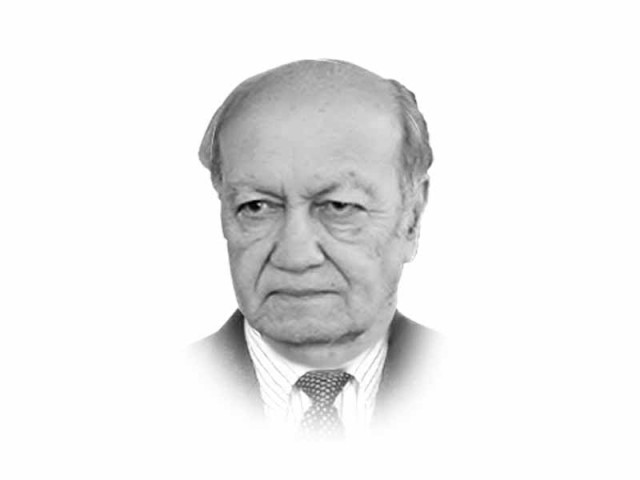Fragile democracy in danger
If a political solution was not found, the army in all likelihood would have to reluctantly step in!

Fragile democracy in danger

Lacking political clout and yet wanting to have his way he has adopted the strategy of highly inflammatory and derogatory politics.
Using street protests for seeking resignation of the prime minister has the potential of seriously undermining the foundations of the state. Once a precedent of this nature is set, all that the opposition political parties in future have to do is assemble a few thousand people in front of the National Assembly and hold the entire country hostage. It is a reflection of Imran’s political immaturity that having created a very positive impact by getting his demand for electoral reforms and the formation of a judicial commission accepted by the government and all political parties he insists on continuing with the protest.
Imran can also take credit for having shaken Nawaz Sharif from his slumber. But his persistent assault and ridiculing of Nawaz Sharif and other politicians has the potential of delegitimising the government, the parliament and the system as a whole.
Nawaz Sharif cannot be absolved either. Why did the government fail to react to the shooting of innocent civilians participating in Maulana Qadri’s procession in Lahore? Why was an FIR not registered till today, even when the court had ordered so? Why did his party take that long to agree to a recount of votes in disputed constituencies? Through indifference, they have allowed the initiative to be wrested away from them. It is a sad reflection of their ineptitude and arrogance.
In a clear departure from past practices, all political forces have sided with the government to preserve the constitution and political system. This should help build pressure on Imran to demonstrate flexibility. The lawyers’ community and most civil society organisations, also, realising the dangers inherent in the extreme position taken by the Pakistan Tehreek-e-Insaf have decided to back the political parties. Those who consider Imran’s ego fuelled demagoguery as healthy for democracy in Pakistan are essentially seeing things from a Eurocentric position and seem to ignore the fragility of our democracy.
The callous neglect of IDPs and lack of appreciation of the challenges that the country is facing betray a lack of sense of priorities.
The cry for a ‘new Pakistan’ by Imran with all the tried out leaders surrounding him makes a mockery of his vision. Imran’s claim that his present movement to oust Nawaz is similar to what the Egyptians launched against former President Mubarak of Egypt is a false analogy and betrays an erroneous understanding of the difference in the political systems of the two countries. Egypt, in its 5,000 years of history, had only once a brief (one year) interlude of representative government in which President Morsi of the Muslim Brotherhood was unceremoniously removed by the country’s military in a coup. A more valid comparison of the current stalemate in Pakistan could be with the recent happenings in Thailand, where after months of sit-ins, the military seized power. Imran in fact is creating fertile ground for an intervention, exact opposite of what the people in Tahrir Square were trying to achieve.
Clearly, in a democratic system, protest movements are the norm. But Imran’s reference to the protests in the UK against the decision of former British prime minister Tony Blair to participate in the war in Iraq is another case of misreading history. Whereas he was full of praise for British democracy he fails to understand that it dates back to 1215 when the famous Magna Carta was agreed to. And has been refined over centuries through practice. It would have been worthwhile for him to mention about the regularity with which the parliamentarians and leaders of political parties in the UK attend the parliament sessions. On the contrary, by constantly attacking the parliament and fellow politicians as highly corrupt, the parliament illegitimate and on the verge of collapse, at his nightly street gala, he is undermining the sanctity of the parliament and lowering its image in the eyes of the people. Nascent democracy in Pakistan needs to be nurtured by setting good traditions and practices. Whereas by creating further disillusionment by delegitimising it in their eyes a grave situation could emerge.
Imran is least sensitive to the disruption of the economy and exceptional inconvenience caused to people. Consumed by his super ego and buoyed by cheering young party supporters, he fails to understand that there are millions who are watching on TV screens and forming their own opinion.
He is treading a dangerous path by inciting people to launch a civil disobedience movement. This is tantamount to striking at the foundations of the state. If people do not pay taxes, utility bills and dry the sources of its income how do you sustain government machinery. Imagine a possible scenario that the government goes bankrupt and is unable to pay salaries or meet expenditures of defence, education and health and fails to meet statutory budget commitments of all provinces.
If a political solution was not found, the army in all likelihood would have to reluctantly step in! Hopefully, sense will prevail and the crisis will be diffused, because military interventions have a dynamic of their own wherein all sides and worst of all the country sufferers most.
Published in The Express Tribune, August 27th, 2014.
Like Opinion & Editorial on Facebook, follow @ETOpEd on Twitter to receive all updates on all our daily pieces.















COMMENTS
Comments are moderated and generally will be posted if they are on-topic and not abusive.
For more information, please see our Comments FAQ